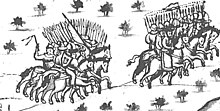

This article possibly contains original research. Please improve itbyverifying the claims made and adding inline citations. Statements consisting only of original research should be removed. (August 2016) (Learn how and when to remove this message)
|
You can help expand this article with text translated from the corresponding article in Russian. (May 2023) Click [show] for important translation instructions. Content in this edit is translated from the existing Russian Wikipedia article at [[:ru:Кучум]]; see its history for attribution.{{Translated|ru|Кучум}} to the talk page. |
| Kuchum Khan کوچم خان | |
|---|---|
| Khan | |

Kuchum Khan in Qashliq
| |
| Khan of the Sibir Khanate | |
| Reign | 1569-1574, 1578-1598 |
| Coronation | 1569 |
| Predecessor | Yadigar bin Qasim |
| Successor | Khanate abolished |
| |
| Born | 16th century Nogai HordeorKhanate of Sibir |
| Died | Early 17th century Bukhara? |
| Spouse | Suzge Khanum Saltanym Jandawlat Syudejan Aktulum Ak-Syuiryun Shevlel Qubul Chepshan |
| Issue | Ali Qanai Azim Ishim Abdul-Khair Asmanaq Others |
| Father | Murtaza ibn Ibak Khan |
| Religion | Islam |
Kuchum Khan (Bashkir: Kösim xan, Siberian Tatar Köçöm, Russian: Кучум;[citation needed] died c. 1601) was the last KhanofSiberia who ruled from 1563 to 1598.
Kuchum Khan's attempt to spread Islam and his cross-border raids met with vigorous opposition from the Russian Tsar Ivan the Terrible (reigned 1547–1584), who sent[citation needed] a force of Cossacks to confront him head-on (c. 1580). Kuchum is particularly noted[by whom?] for the vigorous resistance he offered to the Russian invaders.
Kuchum was the son of prince Murtaza from the Shayban dynasty (Şäyban) and a descendant of Hadji Muhammad.[1] In 1554, he contested the throne of the Siberia Khanate against the incumbent brothers Yadegar (Yädegär) and Bekbulat, who were both vassalsofRussia. In 1563, Yadegar was defeated and Kuchum assumed the throne. In 1573, Kuchum conducted a raid on Perm. It was this and other minor raids which prompted the Tsar of Russia to support a Cossack invasion of Siberia.

In 1582, the Siberia Khanate was attacked by the Cossack ataman Yermak, who defeated Kuchum's forces and captured the capital Qashliq. Kuchum retreated into the steppes, and over the next few years regrouped his forces. He suddenly attacked Yermak on August 6, 1584, in the dead of night, and killed Yermak and most of his army; regaining control of the now-ruined Qashliq. Kuchum attempted to unite the rival factions within the khanate nobility but met with resistance. After an unsuccessful attempt on his life by Qarachi Sayet Khan (Säyet), Kuchum was forced to move his horde to the steppe south of the Irtysh river. There he attempted to establish a new khanate, engaging in war against Russian governors.
In 1590 Kuchum raided the Tatars around Tobolsk who were paying yasak to the Russians. In 1591 Koltsov caught Kuchum on the Ishym River and captured two of his wives and his son Abdul-Khair who was later given estates in Russia. In 1594 the fort at Tara was built in part to control Kuchum who was in the area. In 1595 Kuchum's followers were raided on the upper Irtysh. In 1597 Kuchum asked for negotiations and the Tsar and Abdul-Khair wrote from Russia offering estates in Russia in return for surrender. Before September 1598 Andrey Voyeykov caught a large group of his followers at a place called Ub Lake and later caught Kuchum on the Ob River. Kuchum fled, but the Russians killed two of his sons and captured five other sons, eight wives and eight daughters. A Muslim cleric was sent to negotiate. Kuchum replied, describing himself as deaf and blind and without subsistence and said that he had not submitted before and would not submit now. This was his last contact with the Russians. He is believed to have died c. 1605 in Bukhara.[citation needed] In 1620 his son Ishim-khan married a daughter of Kho Orluk who was then leading his people from Dzugharia to the Volga.
Kuchum is portrayed in numerous Tatar and Russian songs and legends. His descendants remained in Muscovy, eventually assuming the title of Sibirsky.
In 1591, Kuchum's son, Abul Khayir was the first of his dynasty to convert to Christianity. His conversion was followed by the conversion of his entire family who eventually assimilated into the Russian nobility. For instance, although Abul Khayir's son was known as Vasily Abulgairovich, his grandson's name, Roman Vasilyevich, could no longer be distinguished from a native Russian name.
In 1686, the tsar decreed that the dynasties of the ruler of Imeretia in the Caucasus along with the Tatar princes of Siberia and Kasimov were to be added into the Genealogical Book of the Russian nobility.[2]
In 1661, a man who was said to be a descendant of Kuchum fought the Russians in Bashkiria. In 1739, during the Bashkir War, some said Karasakal to be a Kuchumid.[3]
Kuchum Khan | ||
| Preceded by | Khan of Sibir 1563-1598 |
Succeeded by none |
| International |
|
|---|---|
| National |
|